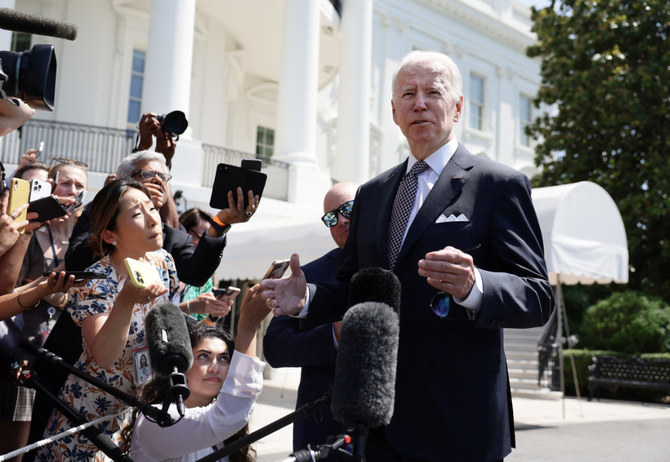Biden’s unique chance to get US-Saudi ties back on track

https://arab.news/ggscz
US President Joe Biden’s first trip to the Middle East since entering the Oval Office, with visits to Israel, the occupied West Bank and Saudi Arabia, could not have come at a better time. Next month’s trip comes a year and a half after he entered office, and is long overdue. Biden is the first US president in two decades to wait so long to visit the region.
Biden’s visit will be overshadowed by a difficult domestic situation. The cost for the average American to fill up their cars and pickup trucks is at an all-time high, and at a time when the nation is beginning to travel again as the COVID-19 pandemic recedes. Inflation remains at a 40-year high. America’s southern border remains in a state of chaos. The midterm elections in November are not looking good for the Democrats.
For reasons that do not make geopolitical sense, Biden has mostly ignored the Middle East. At first, he failed to embrace the regional enthusiasm and support for the Abraham Accords initiated by his predecessor. He has continued to turn a blind eye to Iranian aggression, even when that aggression specifically targets US troops. And he has shown a lack of interest in improving US-Saudi relations. On the campaign trail in 2019, he boasted that he would make Saudi Arabia a “pariah” if he became president.
But now the situation is changing and the president has been hit with new geopolitical realities. Iran remains a serious problem that the US needs to start confronting. The Biden administration is finally waking up to the importance and significance of the Abraham Accords for regional peace and stability. And with Russia’s invasion of Ukraine spiking the price of oil, the White House is scrambling to increase engagement with the oil-producing countries in the Middle East.
In order for his visit to be successful, Biden should accomplish four things.
First, he needs to get the US-Saudi relationship back on track. The economic, energy and security realities in the Middle East leave Washington no other realistic choice but to maintain good relations and close coordination with Riyadh. While in Saudi Arabia, Biden will be attending a special meeting of regional leaders in Jeddah. He should use this opportunity to meet one on one with each head of state that attends. Biden should ensure that his presidential visit is immediately, and regularly, followed up by visits from senior US officials at the Cabinet level. It would also be wise for him to reciprocate the hospitality and invite his counterparts in the region for meetings in the US.
For reasons that do not make geopolitical sense, the US president has mostly ignored the Middle East
Luke Coffey
Second, Biden should build on the successes of the Abraham Accords and try speeding up the normalization of relations between even more Arab states and Israel. To this end, he should be privately encouraging countries in the region that have not signed up to the accords to do so, while also publicly praising them.
Third, Biden should announce that he is scrapping the talks with Iran over its nuclear program and reverting to the Trump administration’s maximum pressure campaign against Tehran. It is becoming clear that President Ebrahim Raisi is not really interested in securing a new deal at this time. Instead, the Iranians are using the Biden administration’s desperation for a new agreement to drag out the Vienna talks and try to squeeze more concessions out of the Americans. Making such an announcement, while standing on the Arabian Peninsula, would send a strong message to the region.
Finally, the Biden administration needs to use the visit as an opportunity to start getting serious about Iran’s threat to regional security. For the past 18 months, Iran and Iranian-backed terrorist groups have been routinely targeting civilian infrastructure, commercial ports, residential buildings and international shipping using ballistic missiles and drones. These same groups have also targeted US personnel and military facilities in Syria and the UAE. However, the Biden administration last year drastically reduced American air defense capabilities in the Middle East. Biden should use his visit as a starting point to work more closely with air partners to ensure security and stability in the region.
While US-Saudi relations started off on the wrong foot with Biden in the White House, this trip is a unique opportunity to get the relationship back on track. It also has the potential to build America’s relations with other Arab countries.
Now is the time for the Biden administration to start pursuing a pragmatic and realistic Middle East policy that advances US interests in the region, while also deepening relations with key partners. If Biden does not use this visit wisely, US-Saudi relations will be on hold until at least 2025. This would be bad for the US, Saudi Arabia, Israel and regional stability.
• Luke Coffey is the director of the Douglas and Sarah Allison Center for Foreign Policy at the Heritage Foundation. Twitter: @LukeDCoffey









































